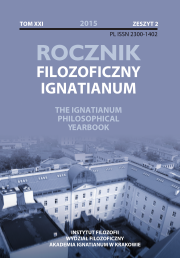The Problem of Rights and Freedom in Andrzej Frycz Modrzewski’s "Commentariorum de Republica emendanda libri quinque"
Abstract
The subject of this article is the problem of rights and freedom in Andrzej Frycz Modrzewski’s "Commentariorum de Republica emendanda libri quinque". It sets out to show how the author sets out the two categories and construes the relations between them. Initially, it aims to highlight the general sources of thinking about rights and freedom in Central Europe, while at the same time offering a broad profile of Modrzewski in the light of his epoch. The main part of the article then presents a selection of ideas taken from his well-known work. It presents his conception of custom as the ground of law, and his furnishing of arguments for the existence of written laws. It distinguishes two criteria by means of which Modrzewski sought to evaluate laws: reason and justice. It outlines the negative aspects of certain acts, the worst of which is murder and its associated problems. His view concerning the incorrect treatment of serfs is also presented, together with his criteria for the selection of officials. This is followed by his innovatory project for reform of the judicial system, in which the key point is the establishment of permanent courts. Modrzewski’s attitude to the issue of freedom, with its distinction between inner and outer freedom, is then explored, emphasizing the inseparable character of the connection between the two concepts. Finally, the distinctively Polish character of the perspective presented is highlighted.References
Arystoteles (2005), "Polityka" Wrocław Zakład Narodowy im. Ossolińskich, De Agostini.
Ekes J (1987), "Złota demokracja" Warszawa Instytut Wydawniczy Pax.
Grześkowiak-Krwawicz A (2008), "Wolność jako zasada ustrojowa Rzeczypospolitej", In Lex est Rex in Polonia et in Lithuania...: Tradycje prawno-ustrojowe Rzeczypospolitej --- doświadczenie i dziedzictwo. Warszawa , pp. 25-41. Biuro Trybunału Konstytucyjnego, Wydawnictwo DiG.
Korolko M (1978), "Andrzej Frycz Modrzewski. Humanista, pisarz" Warszawa Wiedza Powszechna.
Machiavelli N (1972), "Rozważania nad pierwszym dziesięcioksięgiem historii Rzymu Liwiusza", In Wybór pism. Warszawa , pp. 231-623. Państwowy Instytut Wydawniczy.
Modrzewski AF (1953), "O poprawie Rzeczypospolitej" Warszawa Państwowy Instytut Wydawniczy.
Platon (1997), "Prawa" Warszawa Wydawnictwo Alfa-Wero.
Plutarch z Cheronei (1996), "Żywoty sławnych mężów" Wrocław, Warszawa, Kraków Zakład Narodowy im. Ossolińskich.
Sójka-Zielińska K (2000), "Drogi i bezdroża prawa. Szkice z dziejów kultury prawnej Europy" Wrocław, Warszawa, Kraków Zakład Narodowy im. Ossolińskich.
Starnawski J (1981), "Andrzej Frycz Modrzewski. Żywot, dzieło, sława" Łódź Wydawnictwo Łódzkie.
Vives JL (1993), "O wspomaganiu ubogich albo o niedostatku ludzkim" Kraków, Rzeszów Caritas.
Ziętek W (2006), "Koncepcja ustroju państwa Andrzeja Frycza Modrzewskiego. Studium filozoficzno-prawne" Kraków Oficyna Wydawnicza AFM.
(1986), "Koran" Warszawa Państwowy Instytut Wydawniczy.
(1980), "Biblia Tysiąclecia. Pismo Święte Starego i Nowego Testamentu" Poznań, Warszawa Wydawnictwo Pallottinum.
The Yearbook only accepts materials for publication that are free of all conflicts of interest, and that in no way involve conflicts over authorship, copyright, etc. The Editors will take action against any cases of plagiarizing, ghostwriting1, guest/honorary authorship2, etc. Where co-authored work is concerned, the Author listed first is expected to take responsibility for the submission, and is required to make clear the contributions of all of the Co-Authors involved. In the event of the publication owing its existence to funding dedicated to this purpose, this fact should be made clear: e.g. in any note of thanks/acknowledgement, or in a footnote, etc. Explicit notification should be given of any form of reprinting, with the appropriate evidence of permission to publish being furnished as required. Any impropriety on the part of Authors/Reviewers risks exposing them to appropriate responses from the relevant institutions.
______
1 This term refers to instances of a person who has made an essential contribution being omitted from the list of authors, or from notes conveying gratitude and/or acknowledgement.
2 This occurs when a person who has made either an insignificant contribution or no contribution at all nevertheless appears on the list of authors.





